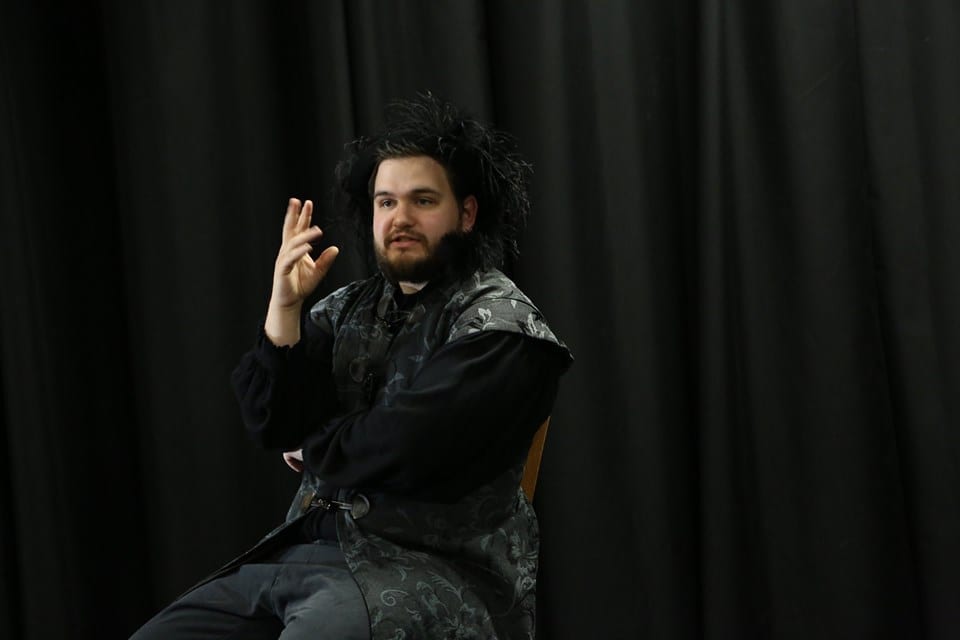PROVO — In 1564 in the English countryside, two baby boys were born who would grow into men with extraordinary gifts: William Shakespeare and Christopher Marlowe. While Marlowe rose to fame earlier by writing the kind of violent tragedies that Shakespeare copied in his early career, it was Shakespeare who achieved social and financial success and lived out his days enjoying wealth and fame. In comparison, Marlowe’s life ended early, veiled in ignominy and political intrigue. In her 1987 script, Shaking the Earth, local playwright, Frances Anne Smeath, paints a picture of Elizabethan London with the richness and detail of a Rembrandt. Marlowe’s life is a tool for exploring the fascinating intersections of power, art, and religion that shaped the English renaissance.

The play makes its way across the seven-year rise and fall of Christopher “Kit” Marlowe. In the first scene the young, handsome, and energetic Kit has just had his first taste of fame. The Cambridge student must decide between completing his schooling and following his pledge to become a minister, or seizing his moment of fame, abandoning his studies and securing a position as an underling and aspiring artist in Elizabeth’s court. His situation is easy to relate to, and the quirky character at its heart could be an interesting emotional exploration but for the dialogue being overcrowded with men named Thomas who all seem to be talking about other men named Richard. As a person with what I can imagine is an above-average familiarity with the important figures of this historical period, I still found myself lost in the flood of names, history, and gorgeous language that fill the opening act. It became difficult to focus on the point of the story. Smeath has clearly crafted each word in this play to match the cadence, tone, and elaborate imagery for which the early modern geniuses are known. Unfortunately, her high craft comes at the expense of clear emotional stakes and flow of action.
The actors do their best to wrap their tongues around the “words, words, words” that flow off the pages. As Kit, Adam Argyle bounces affably around the stage, endlessly spouting clever quips and poetry in a quest to earn the fame he feels he deserves while still following the moral guidance of his heart. Jared Dukapoo as Marlowe’s gentle-hearted friend, Thomas Hariot, speaks with an eloquence and a steadiness that creates a lovely energetic contrast. Cody Eckman gives a scenery-chewing performance as the menacing baddie Robert Pooley. Eckman as Robert Pooley slinks and strides about with wicked aplomb, but has little in the way of clear motives. The character is interested in nothing more than his own power and enjoying the suffering of others—for what ultimate purpose is unclear. Playing a troubled but determined young nobleman, Zachary Ballard demonstrates skillful emotional control. On the whole, the cast is doing their best with a script that would benefit from a paring down of its lovely language.
My compliments go out to director Jarom Brown and producer Mahonri Stewart in their first foray as Prospero Arts and Media. Third Space Studios, on main street, is a lovely intimate venue for this eight-actor play. Perhaps because of the confines of the smallish stage, Brown has chosen to keep the full cast on stage throughout the performance. This style is reminiscent of performance practices from Marlowe’s own time when taverns and courtyards were more common for performances than specifically built theatre spaces like Shakespeare’s Globe. Because of this style, I wish more could have been done in the way of audience interaction. The producing team has provided elegant costumes and props and simple lighting and sound to fill out their simple staging of chairs and blocks. This simplicity allows for greater focus on the language that is clearly the heart of the performance.
Like Marlowe himself, the production is ambitious in its artistry, rather hung up on the cultural/religious expectations of its audience, unaware of a world outside of the western canon, and devoid of women. I was initially startled to learn that the play includes a strong content warning, but was then reminded that I was in Provo. The taboos surrounding the subjects of homosexuality and sexual violence have only ever been able to be reckoned with individually, and this play does grapple with those subjects. In this way, mid-16th century England, where religious and political life were one in the same, might not be so different from Utah in 2019. This play stands as an indictment of a homogeneous (us vs. them) society that outwardly condemns homosexual behavior while inwardly using sex as a tool of control, all while ignoring or pedestalizing 50% of the population (women). As the performance progressed, I found myself wondering what this play might have to say if performed with an all-female cast or with contemporary costume choices. There is much to be interested in when examining a life like Marlowe’s and the times that killed him, and there are many ways for artists to explore how that reflects on our world today. Shaking the Earth is a step in that direction, but misses in its potential to move me.
[box]Prospero Arts and Media’s production of Shaking the Earth plays at Third Space Studios (247 West Center Street, Provo) on June 14, 15, 17, 21, and 22 at 7:30 PM. Tickets are $10-12. For more information, visit their website.[/box]
